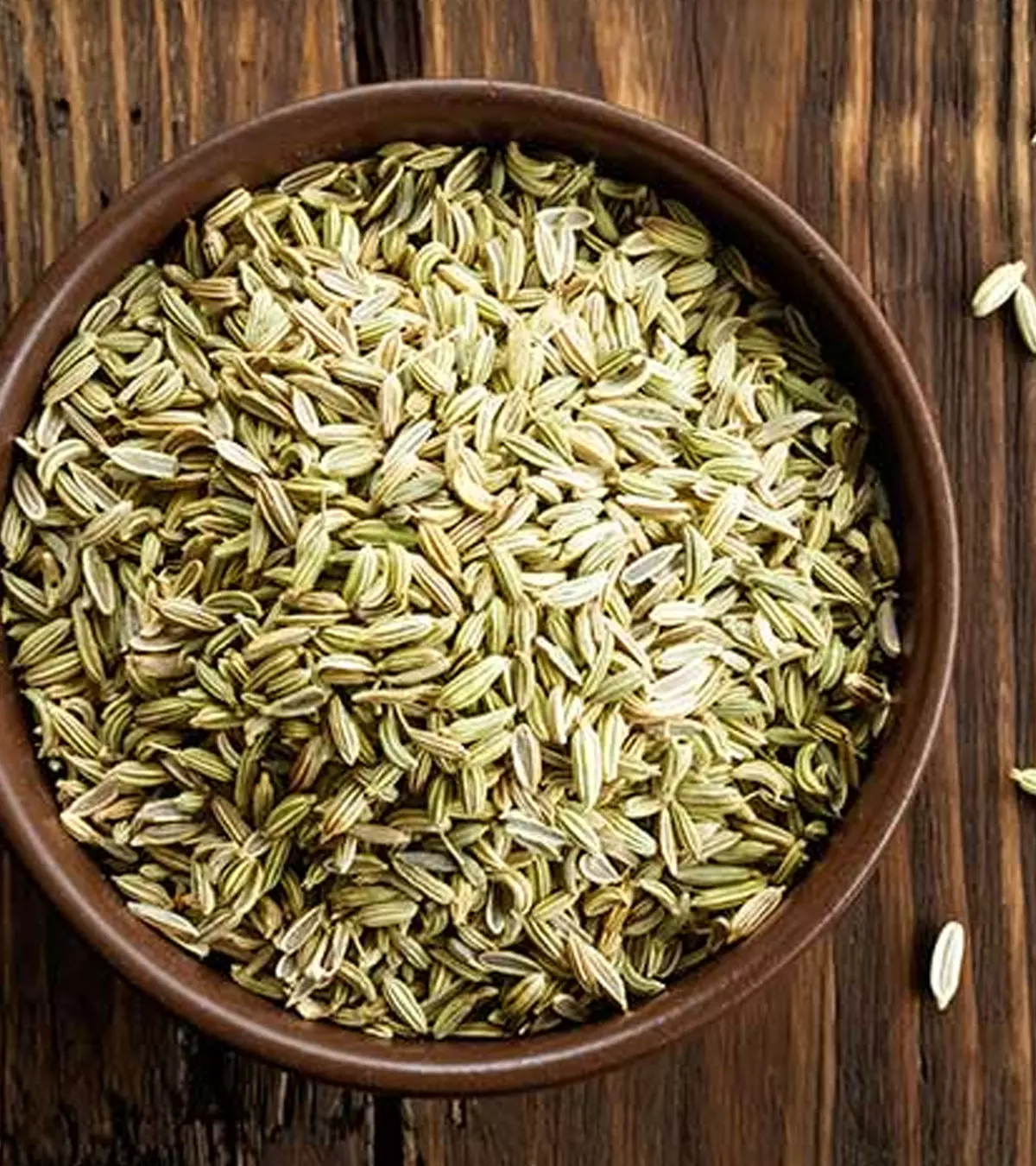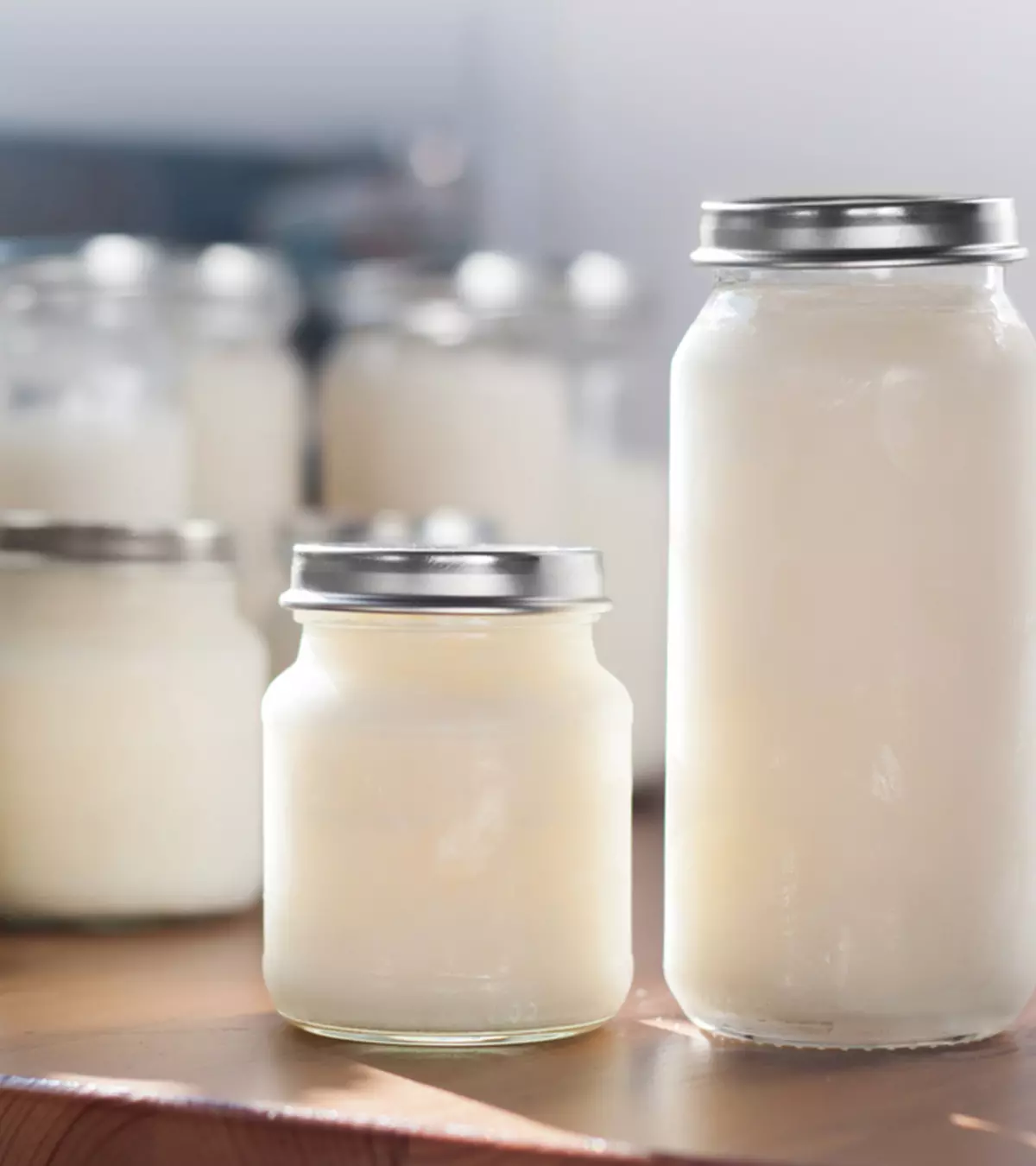
Image: iStock
If you are lactating, you may have been advised to include fruit in your diet. However, there are certain misconceptions about certain fruits, for example consuming papaya while breastfeeding. It is actually one of the most important and healthy fruits to have while nursing. This nutritionally rich fruit is high in vitamins which, if taken cautiously, can improve not only your health but also your baby’s.
Read on to know about this medicinal fruit, including its safety and benefits during breastfeeding. We also suggest some delicious ways to make it a part of the maternal diet.
Key Pointers
- Papaya is a fruit that is low in calories and high in vitamins and minerals, making it helpful in postpartum recovery, weight loss, electrolyte balance, and energy.
- Green papaya is a galactagogue and is an excellent addition to postnatal diets.
- Papaya can boost immunity, muscle function, and prevent infections, digestive issues, and eye problems in breastfeeding mothers.
- Papaya can be added to various dishes such as salads, soups, curries, stews, and stir-fries.
- However, it is crucial to avoid excessive consumption of papaya, and it should not be included in the diet if there is a latex allergy.
Is It Safe To Consume Papaya During Breastfeeding?
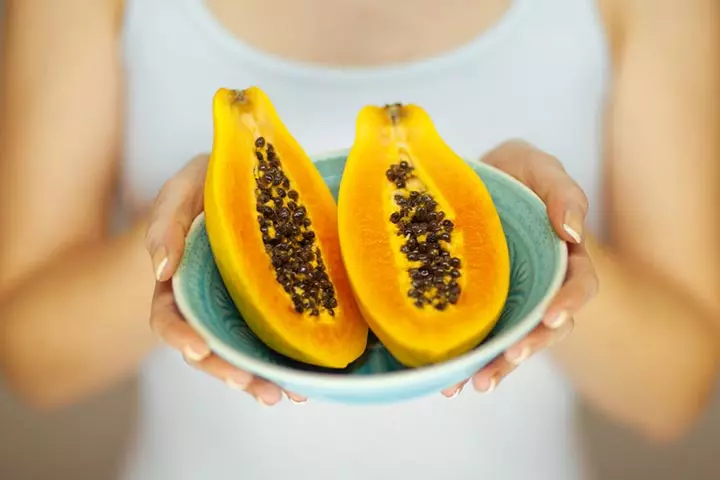
Your postnatal diet is very important because it not only affects your speed of recovery from childbirth but also regulates your milk supply. Doctors advise that breastfeeding mothers consume a balanced diet that includes at least two to three servings of fruits every day. As Papaya is a rich source of essential vitamins and minerals, it is highly recommended for nursing mothers. In fact, it is one of the best fruits to eat while breastfeeding.
Nutritional Content Of Papaya
According to the USDA (United States Department of Agriculture), 100 grams of papaya includes the following nutrients (2):
| Nutrients | Unit Value Per 100 g |
|---|---|
| Energy | 43kcal |
| Water | 88.1g |
| Carbohydrate | 10.8g |
| Total sugars | 7.82g |
| Total dietary fiber | 1.7g |
| Protein | 0.47g |
| Total fat | 0.26g |
| Potassium | 182mg |
| Magnesium | 21mg |
| Calcium | 20mg |
| Phosphorus | 10mg |
| Vitamin C | 60.9mg |
| Sodium | 8mg |
| Iron | 0.25mg |
| Vitamin B5 (Niacin) | 0.357mg |
| Vitamin B6 | 0.038mg |
| Folate | 37µg |
Source: U.S. Department of Agriculture
How Does Eating Papaya While Breastfeeding Affect Milk Production?

Green Papaya, i.e., unripe papaya is a popular galactagogue across Asia. Galactogogues are foods that help breastfeeding mothers make more milk. It is a “superfood” that has a positive effect on the milk composition and can boost the quantity and quality of your breast milk. Thus, papaya is a must-have lactogenic food for lactating moms.
Oxytocin is a hormone that regulates the production of breast milk (1). Intake of green papaya can boost the production of the oxytocin hormone in your body and hence increase the milk flow. Add papaya to your postnatal diet today to nurse your baby and bond with him to your heart’s content.
Other Health Benefits Of Consuming Papaya

Papaya is a tropical fruit, and adding it to your plant-based diet can be extremely beneficial for you. It is a rich source of vitamin A, vitamin C, vitamin E, vitamin K, folate, carotenoids, iron, and pantothenic acidiVitamin B5, responsible for breaking down carbohydrate, synthesis of RBCs and cholesterol, and maintenance of the digestive tract. . It also contains magnesium, potassium, and calcium (2).
Papaya offers the following health benefits:
- The fruit is a low-calorie food offering just 43 kcal/100g, and it contains no cholesterol. If you binge on a bowl of papaya, it can keep your tummy full without adding empty calories. It can also help you with your postnatal weight management.
- It is one of the richest fruit sources of vitamin C. It can help your body heal and recover from childbirth and also boost the immunity of your little one. Eat it every day to keep infections and illnesses, such as colds and the flu, at bay.
- It is a good source of potassium as it offers 182mg of the essential mineral per 100 g. It can help balance electrolyte levels, regulate your blood pressure, boost your energy, improve your cardiovascular health, and enhance the functioning of your muscles.
- The fruit has a soft flesh that contains a good amount of soluble dietary fiber. A regular intake of papaya can work wonders for your digestive system as it can improve bowel function and keep constipation at bay and thus promoting digestion. Papaya contains an enzyme papain, which is in higher amounts in unripe papaya. Papain may have some side effects when consumed in larger quantities.
- Papaya is a storehouse of vitamin A. It can help improve your vision, fight night blindness, prevent aging and protect against macular degeneration.
- It is a rich source of ß-carotene, lutein, and cryptoxanthin. These antioxidants help eliminate free radicals, providing protection against oxidative stressiA disruption in the balance between reactive oxygen and antioxidants, which causes inflammation, DNA damage, and even lifelong diseases. and preventing cancer (3).
 Quick fact
Quick factHow To Have Papaya While Breastfeeding?
Green Papaya has a bland taste, and you can use it as a versatile ingredient while planning and preparing your meals. You can consume it in the raw or cooked form. Here are a few ways in which you can include papaya in your diet:
- You can prepare a bowl of refreshing green papaya salad. You can add hot peppers, a dash of lime juice and garlic to enhance its flavor. Green papaya salad is a great option for healthy snacking.
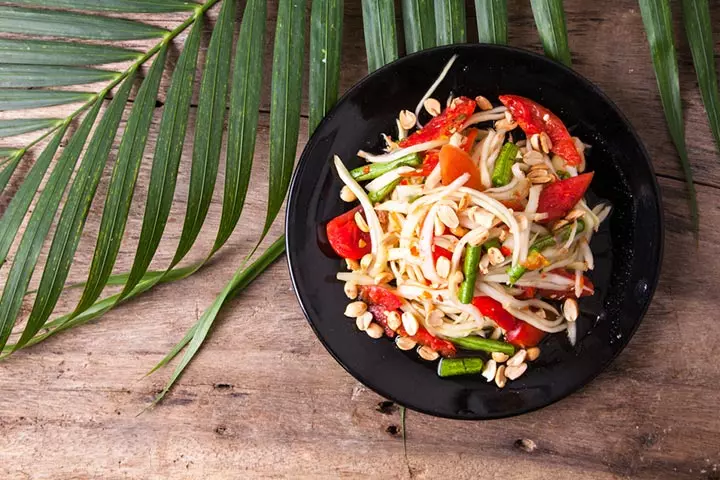
- Green papaya curry is a traditional dish popular in various parts of South Asia.
- Green papaya soup is an excellent way to increase your milk supply and satiate your hunger.
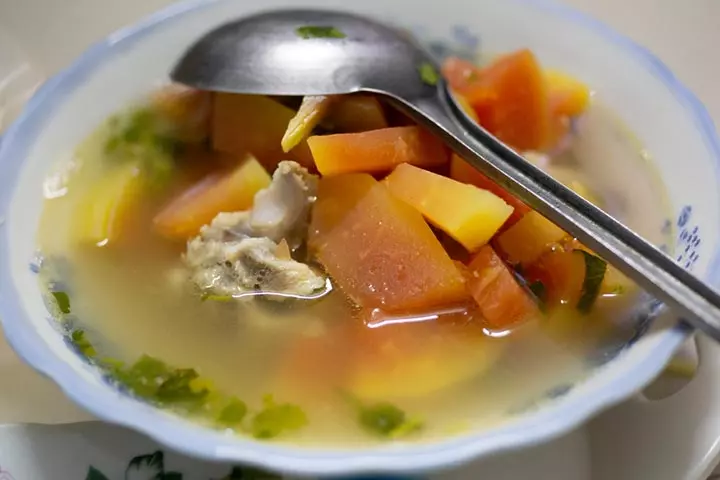
- You can consume green papaya with other vegetables in stew or stir-fried forms.
- Make a healthy smoothie with papaya and other fruits and yogurt for a nutrient-packed drink.
Merilyne C. Milton, a mother, and a keen blogger, shares about eating green papaya after her cesarean birth. She writes, “My body had trouble producing milk the first week after giving birth. My breast milk wasn’t enough for my baby — but it got better every day after I started eating green papaya soup. I don’t know how to describe it in words, but all I can say is that green papaya really works for nursing mothers. This has been one of the traditional food menus for confinement periods among the Kadazan-Dusun community for decades (i).”
 Quick tip
Quick tipA Word Of Caution
Consumption of Papaya may cause severe allergic reactions in sensitive people. If you have latex allergyiAn allergic reaction to the skin caused by the protein content of rubber latex. , it is best to avoid the intake of papaya (4).
Remember to consult your doctor before adding papaya to your diet while breastfeeding. Any food that you consume during this delicate phase can directly affect your health and the growth of your breastfeeding baby. Also, consume papaya in moderate quantities only. It’s important to not have an excessive consumption of any foods or drinks while breastfeeding.
Frequently Asked Questions
1. Can I drink papaya juice during breastfeeding?
Moderate amounts of papaya juice may be safely consumed by nursing mothers and they may benefit from the rich antioxidant activity found in papayas (6). Furthermore, a small group study suggests that papaya leaf juice may help enhance breast milk production (7).
2. Is it safe to eat papaya seeds while breastfeeding?
There is a lack of scientific studies to depict the safety aspects of consuming these seeds while breastfeeding. However, recent animal studies revealed that papaya seeds might adversely affect ovulation (8).
3. Are there any specific types of papaya that are better for breastfeeding mothers?
Unripe papaya is considered more beneficial due to its purported galactagogue potential. However, nursing moms can consume both ripe and unripe papaya in moderate amounts to meet their nutritional needs during lactation.
4. How often and in what quantities should breastfeeding mothers consume papaya?
Breastfeeding mothers are advised to consume at least two servings of fruits daily (9). You can add a serving of papaya to your well-balanced nursing diet to enjoy its nutritional benefits.
Papaya is a nutritious fruit that nursing mothers can consume as a part of their well-balanced diet. Regular intake of papaya, especially green papaya, while breastfeeding can boost breast milk production and supply. Adding papaya to your diet can contribute to your daily nutritional needs and provide your baby with essential nutrients. Nursing mothers can eat green papaya curry or add it to their salad bowl. Consult your healthcare provider before you begin consuming green papaya when nursing to avoid side effects that may affect the health of you and your baby.
Infographic: Numerous Benefits Of Eating Papaya While Breastfeeding
Papayas have a sweet taste and vibrant color. They offer many health benefits during breastfeeding, including an increase in breast milk production. This infographic will list the key benefits of eating papaya for lactating mothers. You may save and share it with other breastfeeding mothers too. Illustration: Momjunction Design Team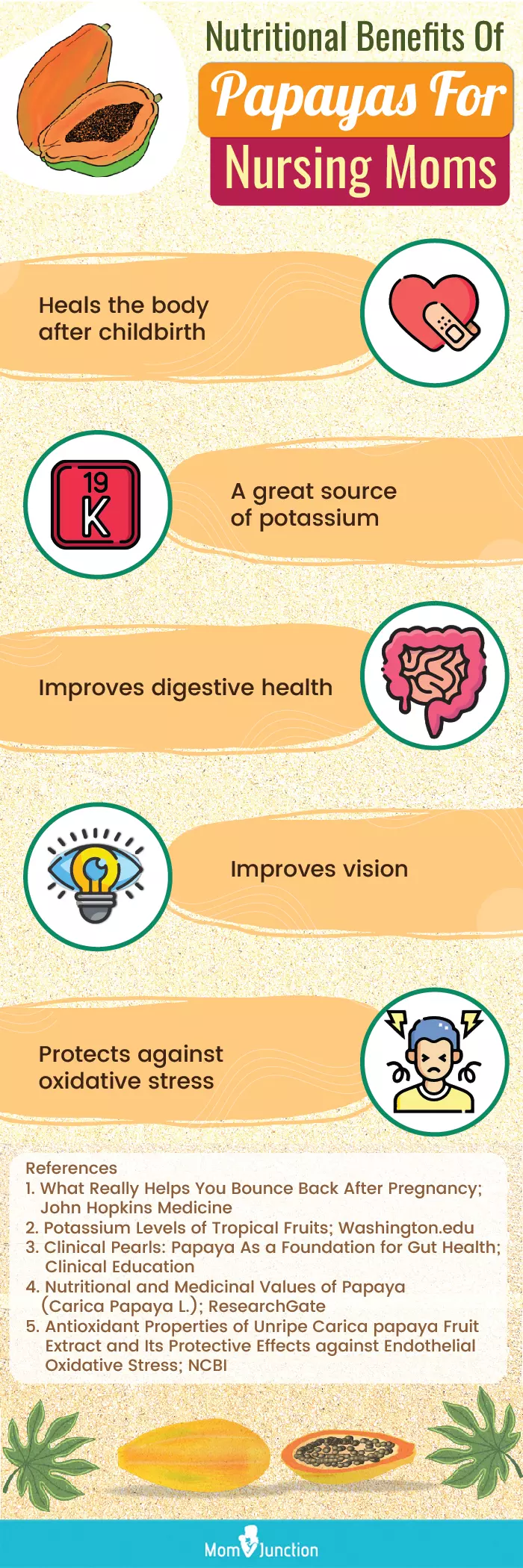
Illustration: Amazing Health Benefits Of Consuming Papaya While Breastfeeding
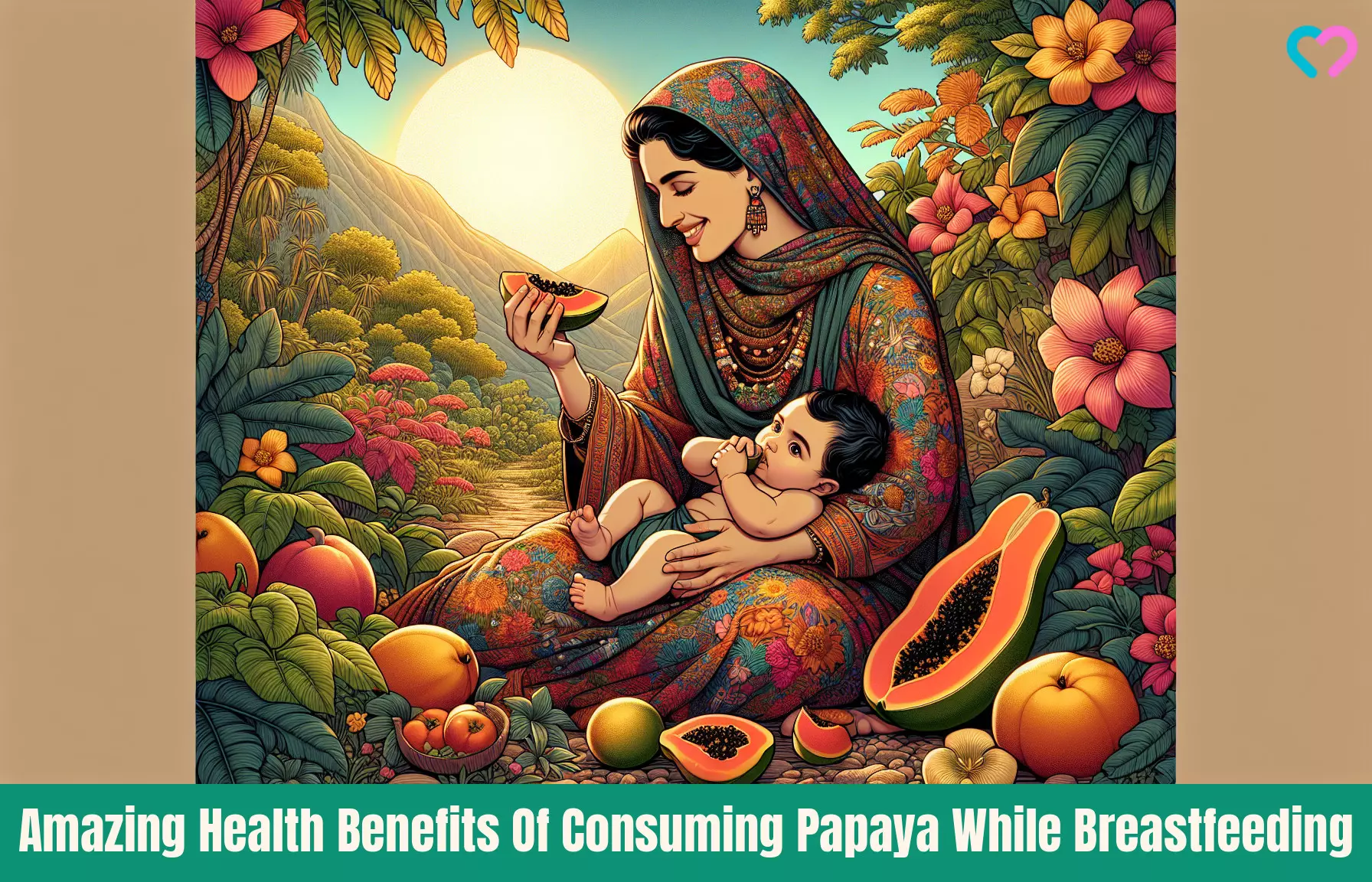
Image: Dall·E/MomJunction Design Team
Personal Experience: Source
MomJunction articles include first-hand experiences to provide you with better insights through real-life narratives. Here are the sources of personal accounts referenced in this article.
i. Green papaya soup to increase milk supply for breastfeeding mothers;https://mmilton82.medium.com/green-papaya-soup-to-increase-milk-supply-for-breastfeeding-mothers-e32841b4d182
References
- The physiological basis of breastfeeding.
https://www.ncbi.nlm.nih.gov/books/NBK148970/ - Papayas raw.
https://fdc.nal.usda.gov/fdc-app.html#/food-details/169926/nutrients - Papaya.
https://www.frontiersin.org/journals/oncology/articles/10.3389/fonc.2017.00023/full - Latex Allergy.
https://my.clevelandclinic.org/health/diseases/8623-latex-allergy - Ellen Pesak et al.; (2021); Impact of Papaya (Carica papayaL.) on Breast Milk Production Enhancement of Nursing Mothers at Teling Atas Public Health Center Wanea Subdistrict Manado City.
https://oamjms.eu/index.php/mjms/article/view/5880/5588 - E J Webman et al., (1989); Free radical scavenging activity of papaya juice.
https://pubmed.ncbi.nlm.nih.gov/2564032/ - Marthia Ikhlasiah et al., (2020); The effects of papaya leaf juice for breastfeeding and working mothers on increasing prolactin hormone levels and infant’s weight in Tangerang.
https://www.researchgate.net/publication/343169313_The_effects_of_papaya_leaf_juice_for_breastfeeding_and_working_mothers_on_increasing_prolactin_hormone_levels_and_infant’s_weight_in_Tangerang - Adejoke Elizabeth Memudu and Tayo Jane Oluwole; (2021); The contraceptive potential of Carica papaya seed on oestrus cycle, progesterone, and histomorphology of the Utero-ovarian tissue of adult wistar rats.
https://www.ncbi.nlm.nih.gov/pmc/articles/PMC7863105/ - Diet for Breastfeeding Mothers.
https://www.chop.edu/centers-programs/breastfeeding-and-lactation-program/diet-breastfeeding-mothers
Community Experiences
Join the conversation and become a part of our nurturing community! Share your stories, experiences, and insights to connect with fellow parents.
Read full bio of Dr. Jessica Madden
Read full bio of Jessica Albert
Read full bio of Dr. Ritika Shah
Read full bio of Shinta Liz Sunny







